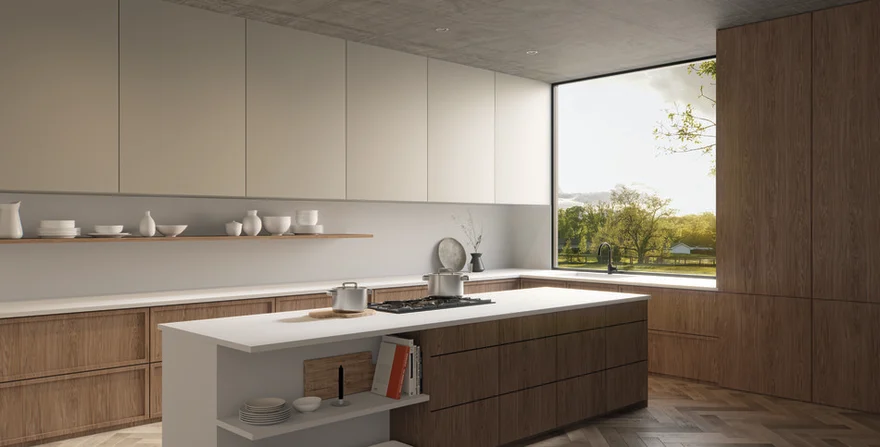Introduction
It is therefore important when one is planning for a modern and sustainable kitchen to consider the type of material to use for his or her project. Out of the available numerous options, porcelain worktops are among the most popular ones with (green) environmentally-friendly characteristics. Whether for a home- or office setting, these worktops present a refined look and are resistant as well as environmentally friendly. It is now the right time to look at some of the benefits that porcelain worktops have for people who are concerned with the environment.
What Are Porcelain Worktops?
Sinks and other porcelain worktops consist of the following fundamental raw materials: clay, kaolinite, and feldspar. They are glazed at very high temperatures to become a surface that is hard wearing and non porous, and aesthetically pleasing. Stylish in color, pattern and finish, porcelain worktops are designed to ape natural stone, marble or concrete with none of the environmental issues of mining quartz or marble.
The more sustainable advantages of having porcelain worktops.
1. Made from Natural Materials
Porcelain does not depict any hazardous components and is formed of natural and easily available raw materials. It can also be noted that the production of porcelain does no involve a process that is as violent as the mining of granite or marble, for instance.
2. Energy Efficient Manufacturing
In the production of porcelain in the modern world, energy conservation is well taken into consideration. Most factories today can adopt green energy and innovative recycling methods and systems to reuse energy sources. Also, that the manufacturing of porcelain releases fewer amounts of greenhouse gases compared to some countertop materials.
3. Recyclable and Long-Lasting
Possibly, one of the most prominent environmental benefits of porcelain is the ability to recycle the material. Porcelain products, therefore, can be reused or recycled at the end of its lifecycle hence minimizing the amount it takes up in the landfill. It also has a long life making it long lasting thus cutting on costs of having to replace it frequently hence eco friendly in the long run.
Durability: A Key to Sustainability
As with many applications, one of the key components of sustainability is product durability, and in this regard porcelain stands out as highly resistant. Porcelain slab has good qualities of non-scratch, non-stain, heat and frost resistance. They last for long periods and are not easily replaced, thus meaning they offer low service life cycle costs. It accommodates the idea that when you opt for a material with a high likelihood of lasting, you will be contributing to the minimization of use of materials that are harming the environment.
Low Maintenance Is Equated To More Environmental Conservation
Porcelain worktops are very easy to clean, you can just use a damp cloth and some mild detergents to keep it looking as good as new. Porcelain does not require chemicals like sealants or rough cleaners, which will greatly minimize the amount of harm to the environment. It is also very hygienically friendly Interlock kitchen as it does not harbor as many bacteria and germs as other surfaces.
Reduced Material Use a Key Factor
Porcelain slabs are less thick and heavier as compared to natural stones and quartz. This design also makes the installation much easier because the panels are lighter and brings down transportation emission levels. It also means that lighter materials consume less transportation energy making their overall carbon footprint considerably small.
Functionality Meets Responsibility
Porcelain worktops are versatile and can be utilised in both kitchens and bathrooms as well as in a garden. Being able to withstand extreme temperatures, these substrates are ideal for outdoor use, thus doing away with the use of different substrate types in distinct zones. Due to this versatility, less material is used to construct them which is beneficial for a minimalist sustainable life.
Porcelain vs Other Countertop Surfaces
1. Porcelain and granite and marble
Granite and marble contain several features which are undesirable- they must be quarried, requiring significant disposals in natural habitats and resources. Porcelain, in this case, is made from clay and some of the most natural resources while glass is made from sand which is a natural resource.
2. Porcelain vs. Quartz
Despite the fact that quartz is known for its longevity, such countertops may contain resins and additives which are not recyclable. Porcelain is much more nat ureal and recycles very easily so it would be preferable for the environmentally aware homeowner.
3. Porcelain vs. Laminate
Laminate countertops are cheaper compared to porcelain but will not last as long as this material. They are easily exposed to wear and tear and in most cases are disposed of and dumped into the landfill. Adding to this, porcelain does not wear out as fast as the plastic material does thus, cutting on wastage production in the long run.
It is also impossible not to mention the other important element: the performance that has to illustrate the movie. By this point, the spectator is already totally lost and does not understand anything.
Supporting a Greener Future
Selecting porcelain worktops provides your home with the sophistication it deserves, while at the same time looking into the future of a greener planet. The use of sustainable materials for instance porcelain emits low carbon, conserves our natural resources, and supports responsible management of resources in construction projects.
Suggestions that might help the person choose the right porcelain worktops:
1.Research Manufacturers: There are currently companies that focus solely on green manufacturing, and one should choose to deal with such manufacturers only.
2.Opt for Certified Products: Select porcelain countertops with certain credentials such as ISO 14001 that points to emission control in production.
3.Consider Local Options: Purchasing from local suppliers is effective in minimizing on the transport emissions.
4.Match Your Style: While there so many designs out there you should look for one that will fit your home and at the same time suits your green initiative.
Conclusion
What people do not know is that choosing porcelain worktops to install in your kitchen or bathroom is a measure for the preservation of the environment. Porcelain worktops are fully natural, very durable, and recyclable; consequently, the motifs embody a combination of style and sustainability in equal measures. Ultimately, by making this choice you can not only enhance the looks of your interior and exterior space but a path towards better sustainability will be taken.











